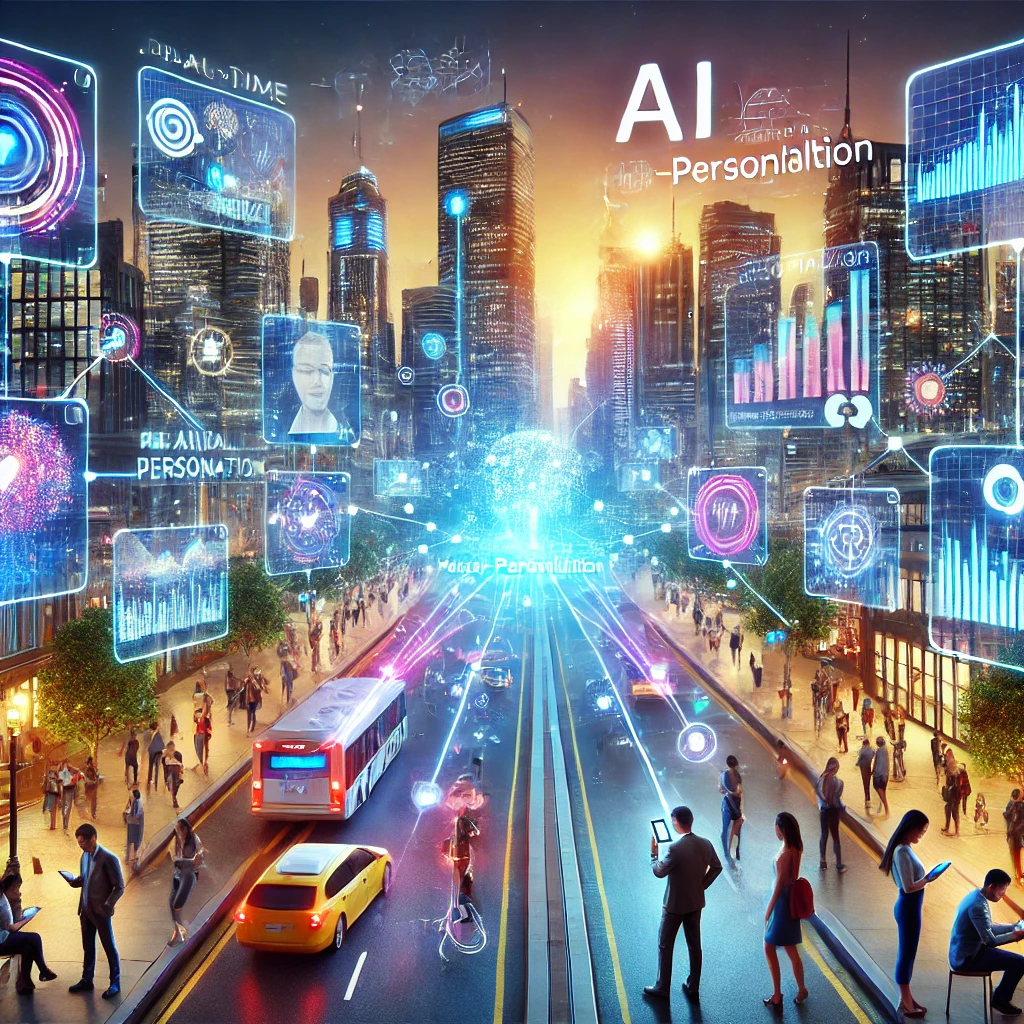In today’s fast-paced digital marketing world, 2024 is shaping up to be a key. Artificial Intelligence (AI) & personalization changing the way brands connect with consumers. Hyper-personalization isn’t just a trend anymore; it’s a must. This piece dives into how personalization has evolved, the tech that powers hyper-personalization, its impact on consumer interactions, ethical concerns, & what the future holds for this innovative method.
The Evolution of Personalization: From Basic Segmentation to Hyper-Personalization
Personalization in marketing has come a long way. In the beginning, it was mainly about just using customers' first names in emails or sending messages based on general groupings like age or gender. While this was a step up from generic marketing – which barely acknowledged customers – it was pretty limited.
That early method used static data and broad categories, which often led to dull or irrelevant experiences for many shoppers. For example, targeting by age or location might have helped products get noticed more. Still, it missed out on understanding what individuals actually liked or needed. As a result, tons of marketing efforts fell flat with no real engagement.
Here’s where AI steps up. It can analyze huge amounts of data and learn from trends. This makes personalization more flexible & driven by data, customizing every interaction to suit what each consumer uniquely wants. The shift from simple segmentation to hyper-personalization is a big deal for how brands communicate. Now, personalization looks at not just who the customer is but also digs into their likes, timing, & how they like to interact.
Hyper-Personalization: Definition and Importance
Hyper-personalization is the next level of marketing—it combines AI and real-time data to deliver content, products, & services that fit each individual customer perfectly. Unlike old-school strategies that might rely on generic discount codes, hyper-personalization goes deeper. It uses AI to understand personal behaviors and predict what someone might want next! This lets marketers create experiences that feel made just for them.
For example, instead of sending out a basic promo email, hyper-personalization checks out a customer’s recent browsing habits & purchases. It sends them a special discount on something they showed interest in—right when they’re most likely to buy! This kind of targeted approach leads to experiences that are much more engaging and relevant.
With hyper-personalization, brands don’t just focus on basic info about customers anymore—they look at what customers are doing now, what they've done before, and even guess what they'll do soon. This helps brands be ready for what customers need & share the right message at the best time.
The Technology Enabling Hyper-Personalization
Hyper-personalization leans heavily on advanced AI technologies. Here are some key tools:
Machine Learning (ML): This is at the heart of hyper-personalization! ML algorithms dig through huge datasets to find patterns & predict future actions. They learn from every interaction so brands can keep tweaking their personalization methods—like figuring out if someone loves shopping late at night!
Natural Language Processing (NLP): This tech helps machines understand and talk in human language better. It makes chatbots & virtual helpers smarter by helping them grasp what customers ask & respond just like a person would. Plus, NLP lets brands check customer feelings so they can adjust their messages accordingly.
Predictive Analytics: By analyzing past data to guess future outcomes, predictive analytics allows brands to personalize things ahead of time! If they see someone bought certain items before, they can suggest similar ones even before that person starts looking!
Real-Time Data Processing: Instant data processing transforms hyper-personalization! AI systems can react quickly to live data—from online behavior to social media—so marketing strategies can change fast too! That’s super important for mobile marketing where timing makes all the difference.
Recommendation Engines: These engines are crucial for personalized marketing efforts! They analyze customer info to offer product suggestions that’ll really connect with each person—like how Amazon & Netflix have nailed their recommendations to boost sales and keep viewers engaged.
The Effect of Hyper-Personalization on Consumer Engagement
Moving from classic marketing to hyper-personalized experiences has changed consumer engagement in big ways! In a world flooded with countless messages every day, it’s tough for brands to make an impact—hyper-personalization helps cut through that clutter by making every interaction feel timely & relevant.
Increased Relevance: A major win with hyper-personalization is its power to make marketing messages hit home more often! People are more likely to engage when content mirrors their interests and behaviors—this means higher open rates for emails and better click-through rates for ads!
Improved Customer Experience: Hyper-personalization makes the overall shopping journey smoother since it tailors everything uniquely for each person! When brands really get who their customers are and what they need, those positive vibes lead customers back repeatedly!
Higher Conversion Rates: Giving the right message at just the right moment boosts conversion chances tremendously! A special deal sent when someone is thinking about buying gets way better results than an ordinary promotion—you’re not just sealing quick deals but also gaining long-term customers who come back for more!
Building Emotional Connections: Beyond just sales numbers, hyper-personalization helps create bonds between brands and their shoppers! When people feel understood & valued by a brand? They’re way more likely to stay loyal and recommend it—talk about brand advocates!
Reduced Customer Turnover: Keeping an eye on customer behavior helps stop folks from leaving! Brands can quickly catch on if something feels off and send out personalized offers or solutions before someone decides to go elsewhere—it builds loyalty without racking up costs related to finding new clients.
Ethical Considerations in Hyper-Personalization
With all these benefits come important ethical challenges too that brands must tackle if they want consumer trust!
Privacy Issues: Since hyper-personalization relies heavily on gathering personal info, rising data privacy fears mean consumers are more cautious than ever about how companies handle their data! It's crucial for brands to be clear about what info is collected and why—not just legalese but real transparency!
Finding Balance Between Personalization & Privacy: Striking the right balance here is super important! Sure, consumers love tailored experiences; however, they also cherish their privacy! Overdoing it with personal data—like being too nosy—could annoy consumers instead of winning them over!
Addressing Bias and Fairness: AI systems depend heavily on input data—if that data isn't balanced? The recommendations might mess up too—which isn't fair at all! Brands should work hard against biases lurking in their systems so all customers receive fair treatment.
Consumer Independence: As AI-driven suggestions become smarter & more powerful there's risk of taking away choice from consumers! If recommendation engines keep pushing only certain options based on past behaviors, then people may miss out on discovering fresh products! Brands got to find ways here that give personalized choices while not shutting other options out.
Following Regulations: With new laws cracking down harder on data protection? Companies must ensure all this high-tech personalization plays by legal rules like GDPR in Europe—and keeping everything safe matters too! Not doing so could bring heavy fines along with damaging reputations!
The Future of Hyper-Personalization in Marketing
As AI keeps evolving forward? Hyper-personalization has exciting developments waiting down the line:
AI-Driven Content Development: Imagining someday when AI creates marketing content tailored just for individuals sounds amazing right? We could see unique video ads based around personal interests or blog posts crafted instantly based off current activities!
Voice & Conversational AI: Voice assistants like Alexa & Google Assistant are rapidly becoming daily essentials—their improvement means upcoming interactions will get even cozier through natural dialogue! Brands will need sharper tactics moving forward as voice search picks up steam along this journey too!
Augmented Reality (AR) & Virtual Reality (VR): AR/VR bring crazy cool chances for hyper-personalized fun experience wise! Picture this—a brand shows you how that sofa fits your living room via AR OR offers virtual tours using VR—they'll amp up engagement tenfold providing totally specialized thrills directly tailored toward YOU!
Personalization Beyond Just Digital Screens: Thanks to IoT growth spreading opportunities manifold—we will see smart homes, conquered vehicles, wearable gadgets allowing physical-world interactions personalized seamlessly. Imagine your fridge suggesting dishes depending upon ingredients sitting inside while your vehicle maps out best roads just for you based around preferences.
Embracing Sustainability and Ethical Personalization to Connect with Eco-Conscious Consumers: With environmental concerns becoming increasingly important to consumers, it’s crucial for brands to focus on sustainability and ethical personalization. Innovations in this area can help reduce waste and promote eco-friendly practices, which is vital for avoiding future challenges. Brands that prioritize ethical considerations are likely to resonate deeply with environmentally conscious customers.



0 Comment